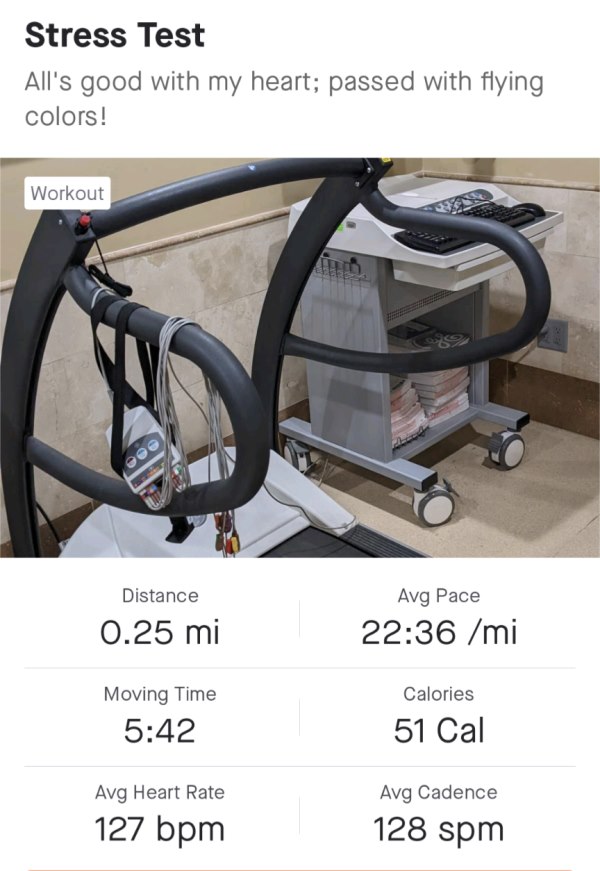NOTE: I was supposed to send out a newsletter this week, but I had to take a break from social media and current events for several days because the world is such a shitshow right now and I’m tired. I wrote this instead, but there are technically five things of interest mentioned throughout.
It’s been almost nine months since I had a stroke, six months after having a mild-ish case of COVID that knocked me on my ass for a few months, in the midst of the first Pandemic Winter, which two years in, is definitely my least favorite season.
Nine months later, they still don’t know why it happened. I’ve passed every physical, neurological, and blood test they’ve thrown at me that might identify a culprit, including a stress test last month that was easier than my average 5k run, which has thankfully become my baseline again. For the most part, everything’s good; back to normal… if you ignore the fact that “normal” ain’t what it used to be.

Physically, I’m probably in the best shape I’ve been in since I got out of the Army in 1993. I lost 30 pounds; I’m eating better and drinking less; I’m running regularly (at least when it’s not freezing outside) and exercising more consistently often.
Mentally, though, it’s a different story; what you’d call the “new normal,” I guess.
Regardless of how quickly I bounced back from the stroke, or that there are no notable indicators it might happen again, I still had a stroke—and everything changed that day. It’s the kind of thing that becomes a reference point for friends and family; an understandable point of concern that puts specific weight behind even the most innocuous, “How are you feeling?”
More importantly, though, it’s a constant reference point for myself. When you don’t know what caused a thing, and it’s an amorphous thing like a stroke that can literally strike out of nowhere, you start to question everything. In the beginning, during the first couple of months of my recovery, it was a legitimate concern about pushing things too far. Take it easy, no running, ever mindful of your heart rate, and my favorite trivia game: “Is that a headache, or am I just exhausted?”
Two years into a pandemic, living in a new old house and working for a startup library vendor, I am definitely exhausted! But also, there were a few times I did have an actual headache, which is the one worrisome sign all of my doctors agree I should be mindful of. And there’s also my right hand, which still hasn’t fully recovered its strength, and gets stiff overnight, every night, sometimes enough to wake me up. When that happens, it often takes a while to fall back asleep, which means I’m more exhausted the next day.
“Is it stiff because I’m having another stroke, or did I just sleep on my arm wrong?”
“Is that a real headache, or am I just exhausted?”
The vague feeling that I can sense things happening in my brain has zero grounding in science, but it still immediately stops me in my tracks to make sure I’m wearing pants, because I refuse to go to the hospital in my underwear!
Rinse. Lather. Repeat.
The New Normal
Another fun angle to ponder is whether or not COVID caused my stroke, an early suspicion for which there’s ever-increasing evidence to support. The uncertainty around it all led my doctor to advise me against getting a booster shot of the vaccine last year, counting on my relatively high antibodies [at the time] to be enough to protect me a while longer. Now that we’ve officially given up on even pretending to stop the spread in the US, I’m really looking forward to the next variant breaking out.
Are my antibodies still high enough? Will that even matter next time?
“Is that a real headache, or am I just exhausted?”
On the bright side, I’m lucky to have a fully remote job where commuting into NYC isn’t a concern anymore. My family is healthy, we’re enjoying our new old house, and things could absolutely be worse. My wife and I have a regular weekly lunch date, and we’re getting the most out of the various streaming services we pay too much for. Paramount Plus is the current favorite, thanks to its Europa League coverage (Real Betis!) and my newfound fondness for Star Trek, specifically season one of Discovery.
My latest gaming escape is Football Manager 2022, in which I’m in my third season coaching Racing Santander, dealing with the ups and downs of strategy, tactics, budgets, and the fickle sports media in lower league European football. It’s basically visual Excel for soccer nerds, and I love it!

And, of course, there’s running. I’d gotten back into a nice groove by the end of last year, but some medication tweaks (hey, new normal!) and a cold-ass Winter knocked me down for the new year. It’s been warming up a bit, and I ran a 5k this morning, and the weather looks like it’ll regularly stay above freezing starting next week, so I’m looking forward to getting back into a groove in time to do our local Cherry Blossom 10k next month.
Throughout this entire pandemic, being able to go out for a run is one of the things that’s kept me sane. When COVID put me on the sidelines for a few months, it had a ripple effect beyond simply not being able to run. Then the stroke knocked me out again. There’s a cliche that running is as much mental as it is physical, and I’ve found that it’s always harder to start running than it is to keep running, so it doesn’t matter how slow or far, as long as I can get out there on a regular basis.
tldr: I’m doing pretty good physically now, but the mental side effects of having an unexplained stroke in the middle of a pandemic really suck. Running helps.
“Go with what is. Use what happens.”
PS: I know Billy Squier’s The Stroke isn’t about this kind of stroke, but it’s been playing in heavy rotation in the back of my mind for nine months now. Oddly enough, I saw him in concert years ago (1982, I believe) as the opening act for Queen. It was my first live concert ever, at Madison Square Garden, and I had no idea who he was nor what his song was talking about at the time.
Do you like email?
Sign up here to get my bi-weekly "newsletter" and/or receive every new blog post delivered right to your inbox. (Burner emails are fine. I get it!)

![Read more about the article Where the Wild Things Are – New [HD] Trailer](https://loudpoet.com/wp-content/uploads/2025/05/Made-for-the-library-300x115.jpg)